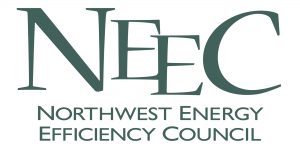Two weeks and counting and the current Washington Legislature is in the thick of committee hearings. While solving the K-12 education funding problem is front and center (and likely will be throughout the session), the usual slate of energy legislation has been introduced. NEEC is closely following a few those bills.
HB 1458: This bill sponsored by Reps. Fitzgibbon, Fey, Farrell and Doglio would direct the Washington Utilities and Transportation Commission to institute rules for investor owned utilities that establishes the baseline for efficiency incentives at the building’s current energy performance level. This baseline would be used even if the project was to bring the property up to the current level of the energy code. As California did in 2015, the legislation recognizes that an unintended consequence of increasing energy code stringency is to leave many buildings “frozen in place.” Owners are challenged to do substantial renovations of these properties when important utility incentives for projects are removed by applying a code baseline rather than existing building performance. NEEC supports the bill.
HB 1334: This bill got its first hearing last week in the House. The legislation is intended to be the successor legislation to the state’s I-937 statute which created a renewable portfolio standard for the 17 largest electric utilities in the state as well as requiring those utilities to acquire all cost effective energy efficiency. With the utilities having met the RPS percentages specified in I-937, a coalition of interests are looking to extend some features of the requirements. The bill would extend energy efficiency requirements previously placed on the large utilities to the small utilities in the state that weren’t part of the original I-937 initiative. The bill also attempts to “lock in” RPS performance percentages on a going forward basis and, in effect, require much of any future load growth by utilities to come from renewable sources. In its first hearing, the bill got little if any support from the utility community and industry groups. NEEC has no position on the bill. As currently drafted, the bill does little to enhance market development for energy efficiency projects across the state.
A third bill, not yet introduced (therefore no bill number), would direct the Washington Utilities and Transportation Commission to establish rules for investor owned utilities to offer a meter based savings energy efficiency program offering. Similar legislation was passed in California in 2015 and since that time, pilot programs across the country are showing the merits of innovative program designs built around calculating and incenting energy savings based on meter data. A new report by the National Resources Defense Council describes national program progress on pay for performance energy program models around the country. NEEC will be closely tracking this bill and hopefully its progress through the Legislature.
